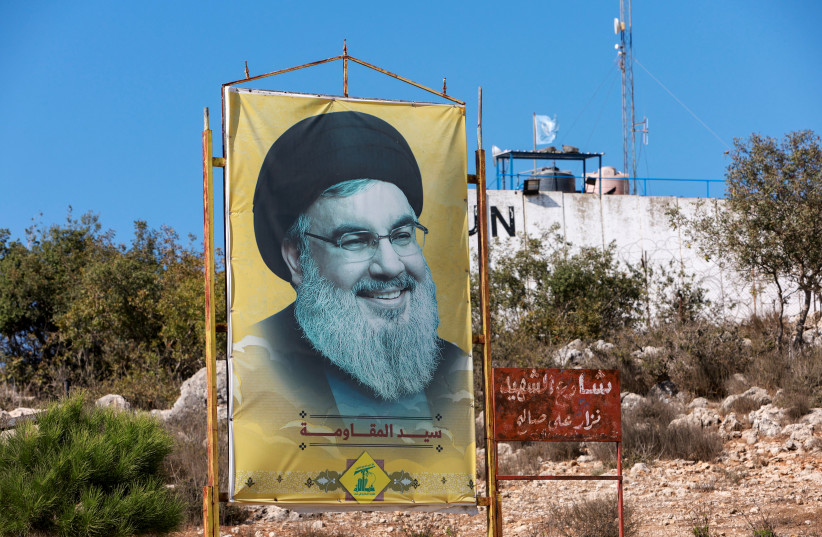Is Hezbollah chief Hassan Nasrallah still just the chief of bluffing or is he actually getting ready to overturn the entire table in the region?
Over the weekend, Nasrallah responded to threats earlier last week from IDF chief-of-staff Lt.-Gen. Herzi Halevi and IDF intelligence chief Maj.-Gen. Aharon Haliva.
The top Israeli military officials had warned Hezbollah of a conflagration if it pushed Israel too far. More specifically, they had said that Nasrallah might get overconfident and misread Jerusalem’s situation and think he can gamble against it.
"[Hezbollah] thinks it understands how we think, which can lead it to dare and challenge us in scenarios where we won’t go to war.”
Herzi Halevi
Halevi said Hezbollah “thinks it understands how we think, which can lead it to dare and challenge us in scenarios where we won’t go to war” in response.
This came one day after Haliva said that Nasrallah might miscalculate his understanding of Israel and accidentally drag both sides into a larger conflict.

Haliva referenced Hezbollah’s recent daring in carrying out a bombing at Megiddo inside Israel. Some had viewed this move by Hezbollah as showing it was ready to pressure the Jewish state more than in the past.
In early April, Hezbollah also allowed certain Palestinian terror groups to fire rockets on Israel from areas it controls.
Hezbollah wants to show it's still fighting Israel
All of this was in the context that generally, since the Syrian civil war mostly ended, Hezbollah has had more attention for other things and has tried a variety of ways to show it is still fighting Israel.
The Jerusalem Post has witnessed the increased presence of Hezbollah operatives ordered by Nasrallah, close to the Metullah border with Israel, even if in civilian clothes. Nasrallah has done this quietly, by erecting numerous new observation towers under the guise of the “Green without Borders” organization.
Besides these quieter, but consistent moves, Hezbollah has also initiated several clashes with IDF soldiers along the border who were working on completing the fence or marking the border.
Nasrallah, for his part, always wants to have the last word, at least in the public sphere of rhetoric.
"You are not the ones threatening war, it is us who do so," Nasrallah emphasized in his recent speech. "And any such war will include all of Israel's borders." He further said that "any wrong action in Palestine, Syria or Iran could lead to a major war."
He further said that "after the Israeli withdrawal from Lebanon in 2000 and the withdrawal from Gaza, the concept of 'Greater Israel' no longer exists. Today, it hides behind walls of fire and is unable to impose its terms in any negotiations with the Palestinians. American hegemony no longer exists in the world, and the mentality in the Arab world has shifted, and this is what worries Israel."
The Hezbollah official stated that any war including all of Israel's borders will have "hundreds of thousands of fighters participating in the campaign" and claimed that "the Israeli front is facing an ideological retreat, it is weak.
These statements summarize some familiar themes by Nasrallah, but which have metastasized following the crisis of IDF reservists saying they would stop showing up for duty to protest the judicial overhaul.
Fifteen years of experience with Nasrallah
Halevi and Haliva were warning that Nasrallah might misunderstand and think that the IDF has actually broken apart and that he can get away with greater medium-level violence against Israel without falling into a war.
To that extent, it was important for them to warn Nasrallah that this could lead to grave consequences.
However, all of this ignores 15 years of Nasrallah history. As former IDF intelligence analysis chief Itai Brun previously told the Post, one of Nasrallah’s key moments in life was his misjudgment that led to the 2006 Second Lebanon War.
According to Brun, Nasrallah really believed in 2006 that if he only attacked a small patrol of Israeli soldiers and only took a few bodies, that Israel would keep its response minimal to avoid war.
He was stunned by the Jewish state’s massive reaction, and since then, this has deterred him from any actions which he thought might lead to war.
So when Nasrallah talks about his spider web metaphor for Israel – his idea that underneath Israel is a weak state which will eventually unravel like a series of flimsy webs – he may not fully believe his own public pronunciations.
As well as he thinks that he understands Israelis and as much as he thought that maybe the IDF would really crack over the judicial overhaul debate, he quickly saw the IDF’s potential ferocity unleashed on six top Islamic Jihad leaders from May 9-13.
So Nasrallah is gambling against Israel more than usual in the current climate, but he still may be far away from risking war.
